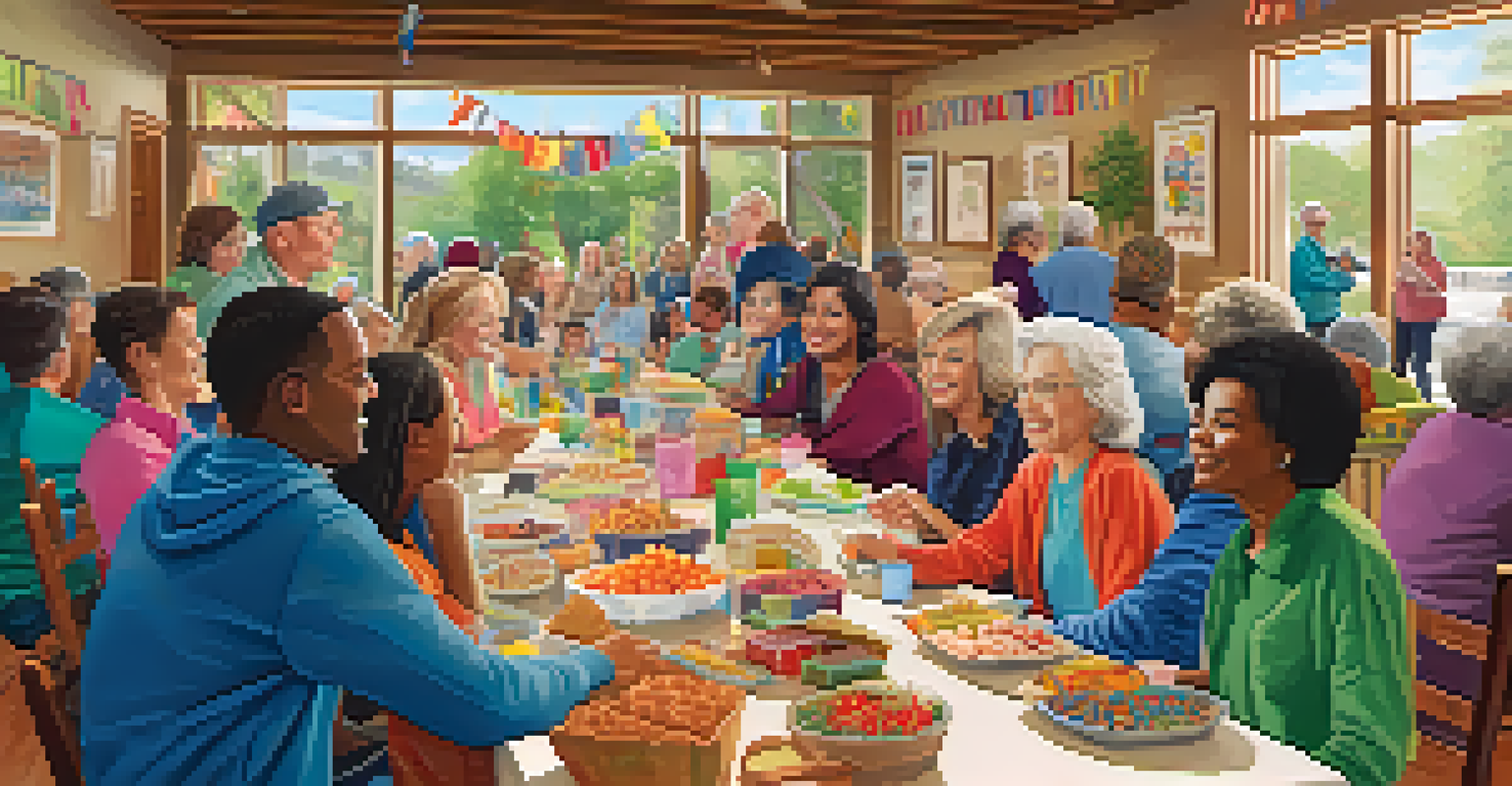Pros and Cons of Living in a Homeowners Association

Understanding Homeowners Associations: What They Are
Homeowners Associations (HOAs) are organizations in residential communities that create and enforce rules for properties. They are typically formed in neighborhoods with shared amenities, like pools, parks, or clubhouses, aimed at maintaining property values and community standards. By joining an HOA, homeowners agree to uphold certain guidelines, which can cover everything from landscaping to the color of your front door.
A sense of community is not just about living in a place; it’s about being a part of something larger than yourself.
One of the main reasons HOAs exist is to foster a sense of community. They often host events, manage common areas, and provide services that benefit all residents. However, it’s essential to read the governing documents before moving in, as they will detail the rules and responsibilities that come with HOA membership.
Understanding what an HOA entails can help you determine if it’s the right choice for your lifestyle. While many appreciate the structure and support provided, others may feel constrained by the regulations. It’s a balance between community involvement and personal freedom.
Pros: Benefits of Living in an HOA
One of the most significant benefits of living in an HOA is the maintenance of shared spaces and amenities. Whether it’s a well-kept park, swimming pool, or community center, these areas can enhance your living experience and provide recreational opportunities. Regular upkeep often means these spaces are cleaner and more enjoyable for everyone.

Another advantage is the sense of community that an HOA can foster. Many associations organize events and activities, such as holiday parties or neighborhood clean-ups, allowing residents to get to know each other. This can lead to lasting friendships and a supportive environment, making your neighborhood feel more like home.
HOAs Foster Community Living
Homeowners Associations create a sense of community by maintaining shared amenities and organizing events for residents.
Additionally, an HOA often has guidelines designed to protect property values. By enforcing rules about home maintenance and aesthetics, they help ensure that the community remains attractive to potential buyers. This can be particularly beneficial if you plan to sell your home in the future, as a well-maintained neighborhood can increase demand.
Cons: Drawbacks of Living in an HOA
While there are many benefits, living in an HOA also comes with its fair share of drawbacks. One of the most common complaints is the monthly or annual fees that homeowners must pay. These fees can vary widely, and if they increase unexpectedly, it can strain your budget, especially if you’re already managing a mortgage.
Good fences make good neighbors.
Another downside is the potential for strict rules and regulations. Some homeowners find the guidelines stifling, especially when it comes to personal expression, like choosing landscaping or paint colors. It’s crucial to consider if you’re comfortable adhering to these rules, as violations can lead to fines or other penalties.
Moreover, decision-making within an HOA can sometimes be contentious. Disagreements over rules, spending, or community projects may arise, and navigating these conflicts can be challenging. If the HOA board is not well-managed, it can lead to frustration among residents and a lack of community cohesion.
The Role of HOA Fees: Are They Worth It?
HOA fees are a central aspect of living in a homeowners association, and understanding them is crucial. These fees typically fund community upkeep, amenities, and sometimes even security. While many residents appreciate the services provided, others may feel the fees don’t match the level of service they receive.
To evaluate whether HOA fees are worth it, consider the amenities and services offered. If your community features a pool, clubhouse, or well-maintained parks, these may enhance your quality of life. However, if you find that you rarely use these amenities, it might feel like a financial burden rather than a benefit.
HOA Fees Fund Community Upkeep
HOA fees support the maintenance of common areas and services, but their value depends on personal usage and preferences.
Ultimately, the value of HOA fees will depend on your personal preferences and lifestyle. It’s essential to weigh the costs against the conveniences and community aspects you’ll enjoy as a homeowner. Engaging with neighbors about their experiences can also provide valuable insights.
Navigating HOA Rules: Understanding the Guidelines
Navigating HOA rules can sometimes feel overwhelming, especially when you first move in. Each association has its governing documents, including bylaws and covenants, conditions, and restrictions (CC&Rs). These documents outline what is expected from homeowners, and it’s essential to familiarize yourself with them to avoid unintentional violations.
Understanding these guidelines can also help you participate in the community more effectively. Many HOAs encourage residents to voice their opinions during meetings or discussions about rule changes. Being informed allows you to advocate for your preferences and contribute positively to community decisions.
It's worth noting that while rules can feel restrictive, they often serve a purpose in maintaining the neighborhood's appeal. Engaging with your HOA and getting involved can help shape the community to better align with your vision, turning potential frustrations into opportunities for collaboration.
Community Engagement: Building Connections in Your HOA
Living in an HOA can provide numerous opportunities for community engagement, which many find enriching. Many associations host regular meetings, social events, and volunteer opportunities, allowing residents to connect with their neighbors. This can foster a sense of belonging and create a supportive environment where everyone looks out for one another.
Additionally, getting involved in your HOA can be a great way to influence community decisions. Whether it's joining the board or volunteering for committees, having a voice in local governance can help address issues that matter to you and your neighbors. Plus, it can be rewarding to see your contributions lead to positive changes in the community.
HOA Rules Can Be Restrictive
While HOA rules help maintain neighborhood standards, they can feel limiting for homeowners who value personal expression.
Ultimately, the level of engagement you experience will depend on your willingness to participate. If you enjoy social interaction and community building, living in an HOA can offer a fulfilling lifestyle. However, if you prefer a quieter, more private existence, it’s important to weigh the community aspect against your personal preferences.
Is an HOA Right for You? Factors to Consider
Deciding whether to live in an HOA requires careful consideration of your lifestyle and values. If you appreciate the benefits of shared amenities and community events, an HOA might be a perfect fit. However, if you value autonomy and dislike rules dictating your property choices, it could feel restrictive.
Take time to reflect on your priorities. Consider how often you would use community amenities and whether you are comfortable adhering to the guidelines set forth by the HOA. It might also be helpful to speak with current residents about their experiences, as this can provide insight into the community culture.

Ultimately, choosing to live in an HOA should align with your personal preferences and long-term goals. By weighing the pros and cons and understanding what to expect, you can make an informed decision that best suits your lifestyle.